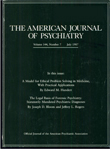TO THE EDITOR: The Special Article by Dr. Strasburger et al., which argued that there is irreconcilable conflict between providing psychotherapy and serving as a forensic expert, contains assertions with which many psychiatrists will disagree. The authors' efforts to assert intangible differences between clinical psychotherapy and forensic practice were given backing in the editorial by forensic psychiatrist Paul S. Appelbaum, M.D., which stressed the ethical incompatibility between clinical and forensic functions (
1).
To their credit Dr. Strasburger and coauthors did not evade the very ethical dilemma that continues to plague forensic psychiatry, namely, that in the medicolegal arena, factors such as lucrative reimbursement for expert testimony may “unintentionally” compromise the search for truth. The authors' hypothesis that psychotherapy is more concerned with psychic reality than with objective search for truth is ill-conceived. Their concept of a therapist being “deliberately credulous provisionally,” which they consider acceptable, is the very grist that promotes the development of factitious disorder and malingering that Dr. Strasburger et al. fear a plaintiff's psychotherapist may fail to diagnose. Effective psychotherapists who balance patients' perceptions and painstaking search for objective truth are unlikely to promote the iatrogenesis that forensic psychiatrist Herbert Modlin has cited as the reason why patients' symptoms fail to resolve and become “solutions” (
2).
The authors overstate the significance of confidentiality in modern psychotherapy practice. Ethical therapists at the commencement of psychotherapy advise their patients that privilege is not absolute, that there are legally defined exceptions, and in the modern era of multidisciplinary therapy and managed health care, persons other than the primary therapist will gain knowledge concerning the patient's contact with the primary therapist. Once given such information, just as surgical patients are informed of the risks of invasive procedures, psychiatric patients can disclose confidential information with the knowledge that absolute confidentiality is an enigma. Lip service to the concept of confidentiality in the past provided unscrupulous psychiatric hospitals the opportunity to overextend patients' lengths of stay, since exploitative inpatient hospitalization could not be remedied without family support, which confidentiality prevented.
Empathy is as much an essential therapeutic tool in a forensic evaluation as it is in clinical psychotherapy. Unless the forensic expert can empathize with a defendant's thought processes before the commission of a harmful act, there is no way that the expert, qualified and as reputable as he or she might be, can phenomenologically understand whether or not a patient experienced a psychotic delusion that resulted in failure to appreciate right from wrong.
Many psychiatrists will agree with Dr. Mossman that honest forensic evaluations have long-range benefits that are in the best interests of the individuals being evaluated and society at large (
3). A problem well recognized in the adversarial judicial system is that justice sometimes prevails at the expense of truth (
4). The authors resort to heady rhetoric in stating that there is boundary violation when a therapist assumes both treating and forensic roles. Balance, not dichotomy, is the ethical principle of such a diverse specialty as psychiatry.

